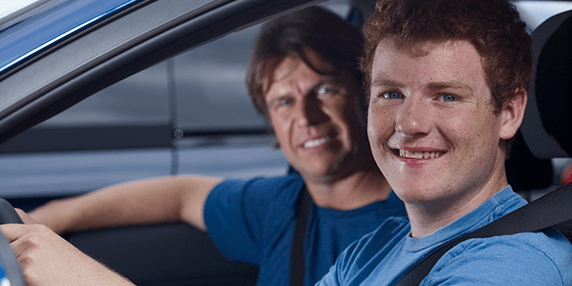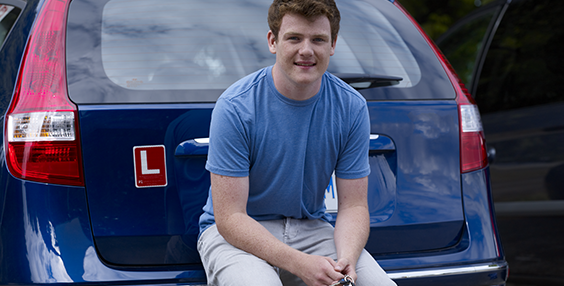Newsroom
Interview with a driver examiner – Tips to pass your road test
May 15, 2019

Are you gearing up to take your road test? If so, you’ve probably heard your fair share of advice from parents, friends and driving instructors.
‘Always shoulder check when changing lanes,’ and ‘stick to the speed limit,’ they tell you. And while these are two great pieces of advice (that are best followed), we tracked down one of our driver examiners to discuss some of the most common road test concerns that test takers face.
Jerry Boal is a long-standing driver examiner at Burnaby Driver Licensing Office. During a road test, he’s the guy who sits in the passenger seat to evaluate your safe driving practices. Read on to learn some of his best tips to help new drivers ace their road test.
When should an L or N driver book their road test?
Jerry: Short and sweet: whenever you feel ready. You can set up an appointment on our booking system 100 days in advance. Let’s say your year as a Learner is coming to its conclusion – you can look ahead to book 100 days prior to your earliest exam date.
April to the end of September are our busiest months. Last year, we hired more examiners to help offset this increase in demand, and we often hire seasonal workers, but it’s still a very busy season for us. Keep that in mind when you start thinking about booking.
What can test takers do to prepare?
Jerry: Drive, drive, and drive some more. Driving experience is huge. Any little bit of experience helps. Even small trips, like driving with your parents to the grocery store. The more exposure you have to being behind the wheel, the more confident you’ll become.
Take some lessons with an ICBC-approved driving school if you can. Even one or two lessons can prove very beneficial. Instructors can help teach you proper driving practices – and possibly point out some ‘bad’ habits your parents might have unwittingly passed on (sorry Mom and Dad). They can also let you know what to expect on the test.
Make sure you read your ICBC manuals – Learn to Drive Smart and Tuning up for Drivers. Practise all the manoeuvres you may be asked to perform as part of your road test, including parallel parking, parking on a hill, and 2- and 3-point turns.
What are some things they can do to help calm their nerves?
Jerry: Warm up those driving muscles. Do some last minute practice, like parallel and reverse-stall parking. Getting to your exam location from behind the wheel can be a big confidence booster. Also, plan to arrive at least 15 minutes prior to your appointment time. Leaving it too late can increase your anxiety and not leave you in the right frame of mind to be at your best.
What’s also very important is to feel prepared. If you’re not ready, you’re bound to feel nervous. You might be feeling pressure from other sources; maybe you need to pass the test for work requirements or for family commitments.Some nerves are to be expected – this is an important test! – but if you’re taking the test only for these reasons, and not because you’ve taken enough time to gain driving experience to feel confident, you likely won’t get the results you were hoping for.
Do you examine the car?
Jerry: Before we can get the show on the road, your examiner will first check out your car, to make sure all the important parts are working properly and you know where things like the horn, parking brake and turn signals are. You'll also need to demonstrate hand signals for turning.
This pre-trip check is important for everyone’s safety. If your car isn't safe enough to drive, we can’t continue the test. See: 10 most common reasons a vehicle might not be accepted for a road test.
When should a test-taker ask questions?
Jerry: At the beginning, we’ll ask you if you have any questions about the test (like speed requirements or where your hands should be on the wheel, for example). You can ask your examiner to repeat their directions or to clarify what they mean, but we’re not there to instruct or to teach.
The test takes between 30 and 45 minutes. During this time, we want you to feel as comfortable as possible. Most examiners are good to do small talk, if that helps put you at ease. However, if you’re not performing well or you are obviously nervous, we’ll leave the talking alone and let you concentrate just on driving. We need to make sure your focus is on the road. Always feel free to let your examiner know how you prefer to conduct your test.
What are some things you’re looking for in a successful road test?
Jerry: We want to see that you’re keeping to the posted speed limits (not with speeding traffic) and keeping a safe distance from other vehicles. Make full stops at stop signs, scan intersections, and be aware of potential hazards. Mirror check, signal and shoulder check whenever you change lanes or direction. Also, watch for school and playground zones.

What are common errors?
Jerry: Not enough observation of your surroundings, such as shoulder checking or during parking maneuvers. Many drivers don’t perform their 360-degree check.
Right shoulder checks: when you’re at a stop, before you proceed to make your right turn, you should complete this shoulder check to ensure there’s no one coming up along your right side, like a cyclist.
Speed maintenance: speeding is a very common error – especially in school or playground zones. Also – driving too slowly. Putting along can also be an area where you lose points.
Turns: make sure you have good vehicle control when you turn. Don’t turn too wide or too short. Keep both hands on the wheel. We want to see good steering recovery, where the wheels turn smoothly.
What do you mean by shoulder-check?
Jerry: The driver’s head movement has to show us that they’re looking fully behind themselves. The shoulder check has to be done at the right time (once you’ve come to a full, legal stop, before making the turn) – don’t leave it too late! An examiner brings his or her own mirror, so we won’t be staring directly at the driver, but we are watching.
What is the speed limit within school or playground zones?
Jerry: You want to be driving close to 30 km/h – maintain this speed as best as you can. Any speed over or below the posted limit is not advised.
Are dash cams allowed?
Jerry: You can’t use anything that can track or record. All tech or digital devices (such as GPS) must be disconnected or turned off before the test starts. You can use a reverse camera, but as a tool – you can’t solely rely on it. We still want to see that you’re looking back when reversing.
What is a standby road test appointment?
Jerry: Offices that conduct road tests offer standby. It’s a great option if you can’t find a test appointment that fits your needs and you perhaps have a half day off. As this is first come first serve and not guaranteed, we recommend arriving at the office at opening time to get your name down first. These appointments come up when someone arrives late, is a no show, has a defective vehicle or if other unforeseen circumstances arise, prohibiting their test. We’re able to accommodate many people in this way, daily.
If you want to hear more driving and safety tips from Jerry, check out his #TipTuesday segments on Twitter @icbc.
